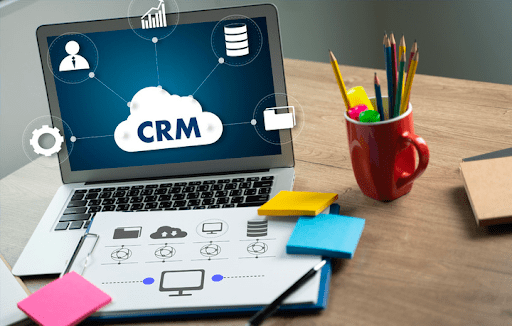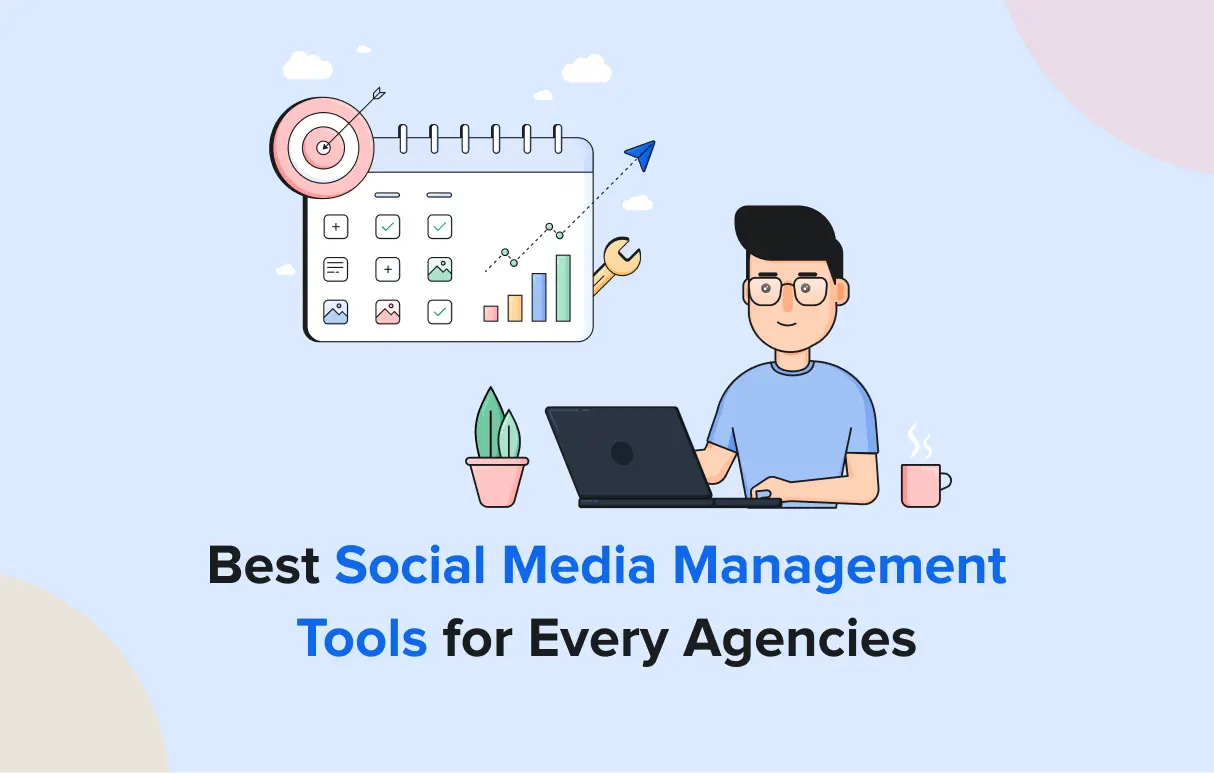In today’s fast-paced world, client management software is essential to foster long-lasting business relationships, retain clients, and stay ahead of the competition.
Kixie’s article highlighted that businesses using CRM tools can achieve an average 29% increase in sales. From customizable dashboards to advanced reporting features, these tools will streamline your client management process and boost your business.
However, with so many options on the market, choosing the right one for your business can be overwhelming. That’s why we’ve created a comprehensive overview of the top 12 solutions available today.
Explore the software solutions below to find your business’s best client management software. Compare features, pricing, pros, and cons to make an informed decision.
12 Best Client Management Software
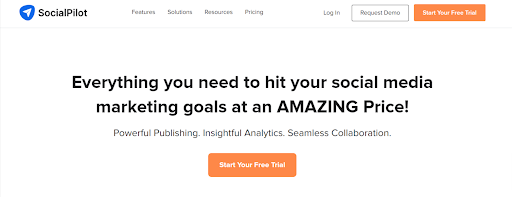
Topping our list of client management software is SocialPilot. The highly versatile tool caters to the needs of businesses of all sizes and offers a variety of features, including social media management, team collaboration, client reporting, and more. With SocialPilot, you can streamline your client management processes, ensuring efficient communication and collaboration across teams.
One of the standout features of SocialPilot is its ability to allow multiple team members to work on client accounts simultaneously, with each member having their own login credentials and access levels. This ensures that everyone on the team is on the same page and make social media collaboration seamlessly.
Moreover, SocialPilot’s client reporting features are top-notch, providing real-time analytics and data to help you track your client’s social media performance and progress.
All in all, SocialPilot offers an unbeatable combination of features, affordability, and ease of use, making it the perfect solution for businesses looking to streamline their client management processes.
Top Features
- Track team productivity with automated client reports and collaborative workflows
- Never miss a deadline with task management and calendar features
- Streamline approval processes with Approvals-On-The-Go
- Simplify your client communication with the centralized client inbox
- Analyze campaign performance with advanced analytics and reporting tools
- Improve your team’s efficiency with customizable workflows and approval processes
- Collaborate with clients and team members in real-time with the chat feature
2. HubSpot
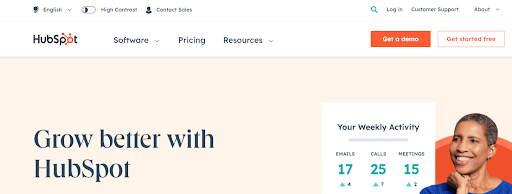
HubSpot is a comprehensive client management software offering various tools for businesses to manage their customers’ data, track their interactions, and automate their marketing and sales processes.
With its easy-to-use interface and powerful features, HubSpot enables businesses to build stronger relationships with their clients, analyze customer behavior, and identify new growth opportunities.
HubSpot’s suite of features includes contact management, lead generation, sales automation, customer service, and marketing automation. The software also integrates with popular third-party applications like Salesforce, Shopify, and Slack, making it an all-in-one solution for businesses of all sizes.
To get a deeper understanding of its features and how it stacks up against other marketing solutions, check out our detailed HubSpot tool review.
Key Features
- Marketing, sales, and customer service modules
- Email marketing and automation
- Lead management and analytics
Pros
- Comprehensive suite of marketing, sales, and customer service tools
- Great support and community
- Robust reporting and analytics capabilities
Cons
- Expensive pricing for larger businesses
- Steep learning curve for beginners
- Limited customization options for certain features
3. Zendesk
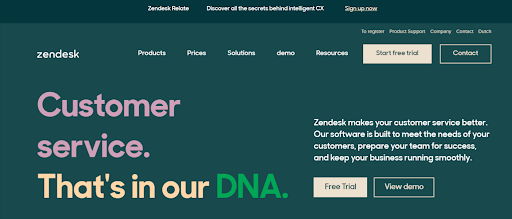
Zendesk is a powerful all-in-one platform that seamlessly integrates customer support and sales tools to enhance business communication and customer relationships. With its comprehensive contact management database, businesses can gain a 360-degree view of their customers, including their activity history and social data.
The platform’s sales tool, Zendesk Sell, offers a range of impressive features, such as sales prospecting, call logging, integrations, and analytics. What sets Zendesk apart from other platforms is its unique approach to unifying sales and support teams. Doing so helps improve sales habits, promote collaboration, and foster meaningful customer relationships.
Zendesk is an excellent choice for businesses looking to enhance their sales and marketing results while improving customer satisfaction. With its intuitive interface and comprehensive suite of features, it’s a game-changer in customer relationship management.
Key Features
- Knowledge base and self-service options
- Ticketing and helpdesk system
- Live chat and help center
Pros
- Excellent customer support tools
- Scalable and customizable
- Seamless integration between Zendesk products
Cons
- Highly limited features at lower price plans
- Tends to be pricey for larger teams
4. Salesforce
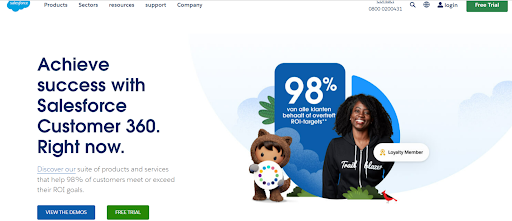
Salesforce is an all-in-one client management software solution offering advanced features such as contact management, lead and opportunity tracking, sales forecasting, and performance analytics. Its customizable dashboard overviews client interactions, account details, and customer service cases.
With its AI-powered tools and process automation capabilities, Salesforce allows businesses to streamline their sales processes, increase productivity, and improve customer service. Additionally, Salesforce’s app marketplace is home to thousands of third-party apps, custom app components, and certified consultants that businesses can leverage to extend the platform’s functionality and tailor it to their needs.
Overall, Salesforce is an excellent choice for businesses that want to boost their sales and marketing results while fostering meaningful customer relationships. It caters to sales reps, managers, and executives, making it a versatile and comprehensive solution for businesses across sectors and regions.
Key Features
- Sales, service, and marketing automation
- Customizable dashboards and reporting
- App marketplace for additional integrations
Pros
- Robust and feature-rich CRM
- Highly customizable and scalable
- Large ecosystem of integrations
Cons
- Steep learning curve
- Numerous add-ons and extra fees for third-party tool integration
5. Zoho CRM
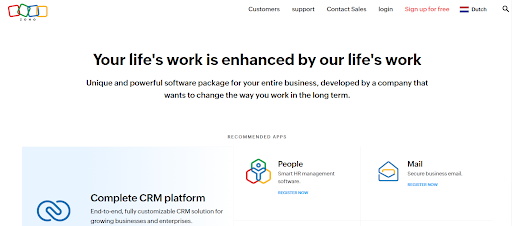
Zoho CRM is a cloud-based customer relationship management solution that provides businesses with a 360-degree view of their sales cycle and customer data.
The client management software offers features such as lead and contact management, workflow automation, email marketing, and more. Zoho CRM’s standout feature is its AI-powered SalesSignals, which helps sales reps identify and act on key customer behaviors in real time. The platform also provides mobile apps, third-party integrations, and a marketplace with extensions and add-ons.
Zoho CRM’s customization options and affordable pricing make it an excellent choice for small and medium-sized businesses looking to manage their sales cycle more effectively. Overall, Zoho CRM is a robust, user-friendly solution for managing customer relationships.
Key Features
- Sales and marketing automation
- Customer support and helpdesk
- Multi-channel access to customers through phone, email, social media, and live chat
Pros
- Affordable and flexible pricing
- Easy to use with an intuitive interface
- Wide range of features
Cons
- Limited customization options
- Most of the automation features are only available at higher-priced plans
6. Pipedrive
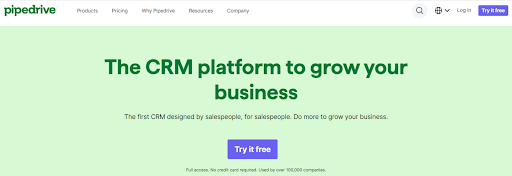
Pipedrive stands out because of its robust features, including sales pipeline management, chatbots, web forms, and AI-powered sales assistance. This CRM solution seamlessly syncs with Google and Microsoft, offering comprehensive contact activity history and tools for managing leads and deals.
In addition to these features, Pipedrive offers integration with more than 300 popular apps, enabling businesses to automate financial management processes, communicate with remote teams, and generate leads. This tool is a versatile and powerful choice for managing client relationships and optimizing sales performance.
Key Features
- Sales pipeline management
- Email integration and automation
- Lead and deal tracking
Pros
- Simple and easy-to-use interface
- Strong focus on sales pipeline management
- Solid integration options
Cons
- No free plan
- Automation, document integration, and most email features are only available in higher tiers
7. Monday.com
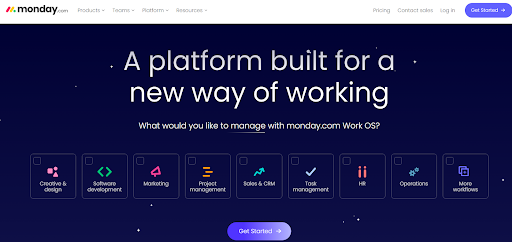
Monday.com is a highly flexible and intuitive workflow and team management solution suitable for all types of businesses. Its all-encompassing platform streamlines various departments, such as creative, design, HR, sales, and customer relationship management, making it a top contender in the client management software arena.
One of Monday.com’s standout features is its ability to manage sales pipelines using the Kanban view and provide centralized data review, informative contact cards, and customizable templates for sales and CRM.
In addition, Monday.com promotes transparency by enabling clients to access project boards, improving communication, and reducing the time spent on status updates. The platform’s centralized client information, file sharing, and project roadmaps streamline collaboration and communication, making it an excellent choice for businesses of all sizes.
Key Features
- Project and task management
- Team collaboration and communication
- Workflow automation
Pros
- Highly customizable and adaptable
- Great for project management
- Easy integration with numerous other tools
Cons
- The free plan has a two-person limit, making it unsuitable to try as a team
- Cluttered interface
- Time tracking is only available for Pro and enterprise users
8. Vcita
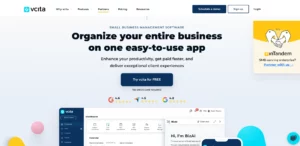
Vcita is a dynamic all-in-one business management platform designed to streamline client management, scheduling, payments, and marketing for small businesses. With its centralized CRM, businesses gain a holistic view of their clients, including communication history, payment records, and service preferences.
The platform’s standout feature, BizAI, empowers businesses with AI-driven tools to generate tailored service descriptions, compose client responses, and suggest next steps based on interactions. By combining smart automation with user-friendly tools, vcita helps small businesses improve efficiency and client relationships.
Vcita is an excellent choice for businesses looking to simplify operations, increase revenue, and enhance customer satisfaction. Its intuitive design and comprehensive feature set make it a valuable asset for business management.
Vcita’s innovative approach, especially with BizAI, helps businesses save time and focus on growth. Its powerful features and user-centric design make it an essential solution for modern small businesses.
Key Features
- Appointment scheduling and calendar management
- Secure payment processing
- AI-driven marketing and communication tools
Pros
- Tailored for small business needs
- Streamlines administrative tasks
- Integrates scheduling, CRM, and payments in one platform
Cons
- Some features require premium plans
- The learning curve for advanced features
9. Agile CRM

Agile CRM is an all-in-one, cost-effective marketing tool designed for small and medium-sized businesses that streamlines sales, marketing, and customer service, all on a single platform. This affordable solution comes with modern features and easy implementation.
Agile CRM provides single-page contact management, deals tracking, appointment scheduling, project management, and gamification to boost sales performance. Additionally, the platform provides marketing automation, email marketing, mobile marketing, email tracking, and a helpdesk for personalized customer experiences.
Additional features such as feedback management, ticketing, and canned responses help improve customer relations and streamline support processes. One of its unique features is the drag-and-drop designer, allowing for creating personalized email templates and landing pages without any coding knowledge.
Agile CRM’s intuitive user interface and affordable pricing make it a great option for businesses looking to improve their customer relationships, automate their marketing efforts, and enhance their sales processes.
Key Features
- Sales, marketing, and service automation
- Web and mobile-ready user interface
- Email and mobile marketing
Pros
- Comprehensive features for sales, marketing, and customer service.
- Affordable pricing plans.
- Integrates with popular apps like Slack, Mailchimp, and Zapier.
Cons
- Steep learning curve for beginners.
- Limited customization options.
- Occasional glitches and slow loading times.
10. Freshsales
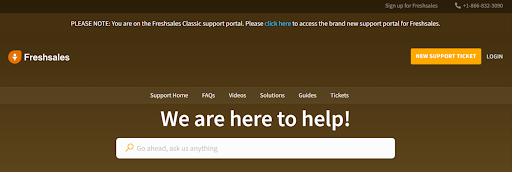
Freshsales is designed to accelerate revenue with context-driven sales. By personalizing engagement and leveraging customer data, Freshsales allows you to shorten your sales cycle and grow your business effortlessly.
Freshsales offers a 360° view of your customers, providing a comprehensive understanding of their interactions to deliver personalized experiences. One of its key features is the AI-powered chatbot, which engages with website visitors in real time, helping you generate more leads.
This software enables contextual engagement, allowing personalized messaging across various communication channels like phone, email, chat, and SMS. With automated sales campaigns, upselling and cross-selling to your customer base becomes a breeze, ensuring long-lasting relationships and increased customer value.
Key Features
- 360-degree view of the customer
- AI-powered analytics and insight
- Personalization and customization options
Pros
- Intuitive interface and easy to use
- Strong focus on sales and lead management
Cons
- Limited third-party integration
- Most CRM customization options are not available for free and basic plans
11. Keap
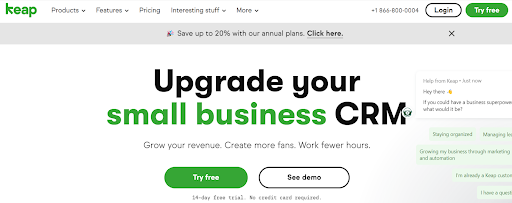
Keap is a powerful client management software designed for small businesses. With integrated email marketing and appointment scheduling, Keap helps businesses centralize client management.
The tool offers a range of features, such as marketing and sales automation, recurring payments, and advanced reporting to help streamline business operations.
Keap’s visual sales pipeline dashboard and integrations with apps like Quickbooks and WordPress make it easy to manage sales processes and convert leads into customers. Additionally, Keap’s custom forms, pre-written emails, and automated lead capture features help businesses efficiently convert leads into loyal customers.
Key Features
- Integrated email marketing and automation
- Visual sales pipeline dashboard
- Automated lead capture and conversion
Pros
- Comprehensive CRM and marketing solution
- User-friendly interface
- Good for small businesses
Cons
- Expensive for larger teams
- Limited third-party integrations
12. Nutshell
Nutshell is a customer relationship management (CRM) platform designed to help businesses, particularly small to medium-sized ones, manage their sales and marketing processes. This small business CRM serves as a central location for organizing customer information, conversations, and leads.
The software’s features include sales and lead automation, contact and pipeline management, and reporting and analytics. It also offers email marketing capabilities, allowing users to create and send targeted email campaigns. Nutshell is designed to be user-friendly with an intuitive interface.
Nutshell integrates with a variety of third-party applications, including Google Workspace, Microsoft 365, QuickBooks, and Slack. These integrations allow businesses to connect their existing tools and streamline their workflows.
Key Features
- Sales and marketing automation
- Contact and pipeline management
- Reporting and analytics
Pros
- User-friendly interface
- Helpful customer support
- Customizable features
Cons
- Limited customization for some features
- May not be ideal for larger businesses
Effective client collaboration goes hand in hand with the right management tools, and our detailed guide on client collaboration highlights how agencies can build stronger, more transparent relationships with their clients.
Conclusion
In today’s highly competitive business landscape, investing in reliable client management software is no longer optional—it’s essential.
By choosing the right solution, businesses can gain a comprehensive understanding of their clients, streamline collaboration, and strengthen long-term relationships. The key lies in identifying your business needs and aligning them with a tool that simplifies workflows and drives measurable growth.
While all the tools listed are strong contenders, SocialPilot stands out as an all-in-one social media management platform designed to help agencies and businesses manage multiple clients with ease. With powerful features like bulk scheduling, seamless client collaboration, approval workflows, and in-depth analytics, all at unbeatable pricing – it ensures you can focus on scaling your agency without the stress of handling day-to-day complexities.
Make the smarter choice today and explore our pricing plans to see how SocialPilot can transform your client management and help your business thrive.
